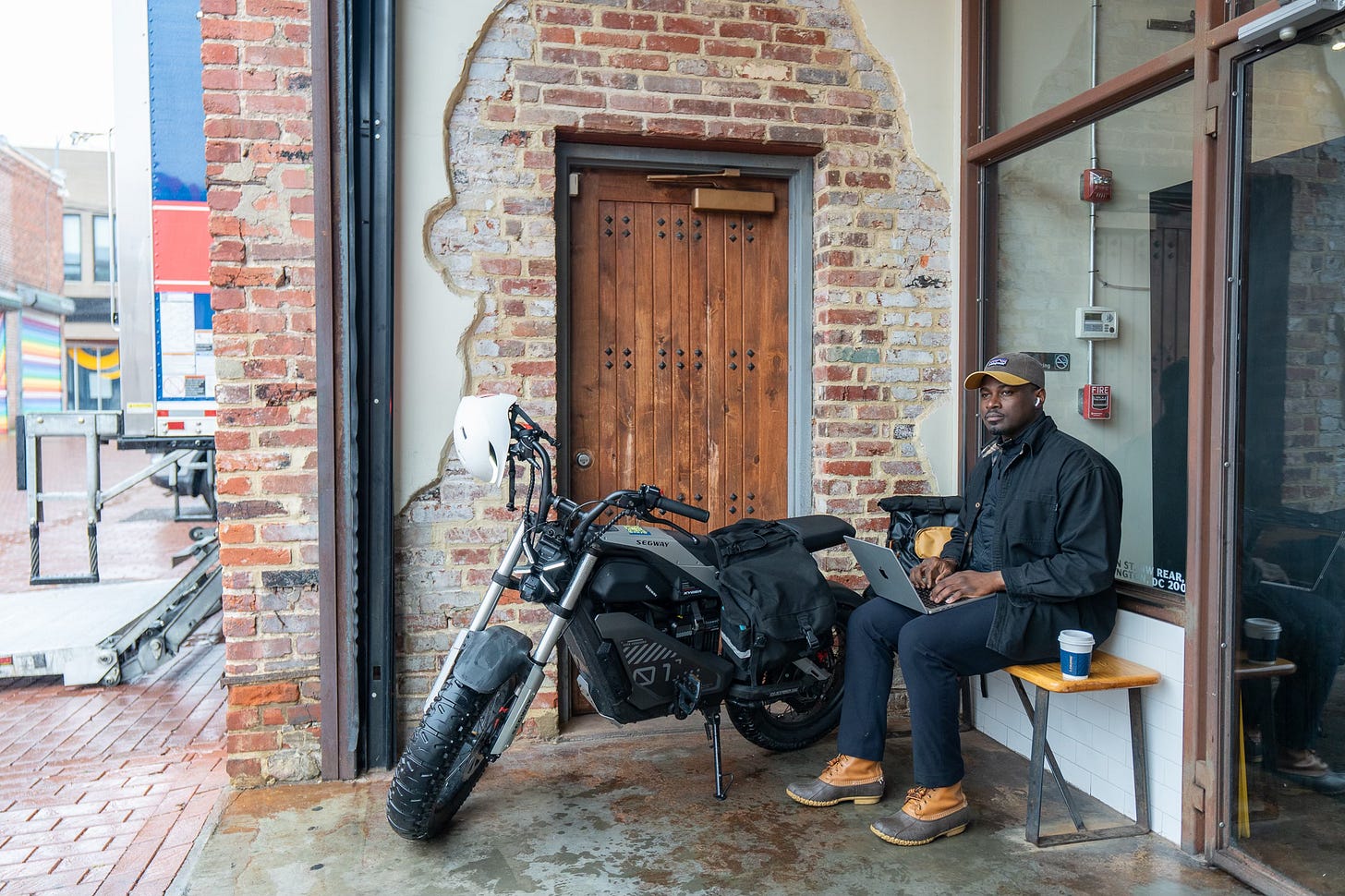Tech Won’t Save Us, But Community Might
Real solutions are growing on rooftops, riding through cities, and rising in resistance to unchecked AI
Issue #21| June 2025
Up Top Acres Is building Farms Above Our Heads
During DC Climate Week, we literally toured one of the freshest rooftops in the city. Up Top Acres is a national leader in rooftop farming and urban agriculture, managing over 40 farms and gardens across the East Coast.
We visited their rooftop location just blocks from the Capitol, where they’re harvesting lettuce, basil, tomatoes, strawberries, kale, herbs, and new ways of thinking about what a building can be. These rooftop farms help reduce stormwater runoff, cool buildings, and bring people together.
This is solarpunk in action: community-rooted, climate-smart, and straight-up organically delicious :).
By turning underused rooftops into vibrant farms, Up Top Acres is creating:
Green Spaces in concrete urban cities
Circular Economy through hyperlocal food systems
Community-Driven Governance, where residents help shape the places they live and eat!
So next time you pass an office building, look up and it might be a beautiful place to gather with a salad bowl waiting to be served, solarpunk style. 😊
🌍 Community-Driven Governance
From Taxi Cabs to Waymo: Who’s Steering This Ship?
Okay, pause.
Have you ever thought about how wild it is that we went from yellow cabs to Uber to driverless ride-hailing—all in just one generation?
What’s wild isn’t just the tech. It’s how silently we adapt. We trade control for convenience. But behind every evolution is a power shift, and we rarely stop to ask: Who benefits from this future we’re walking into?
Before the next wave of AI and automation rewrites our cities, we need conversations—not just about what tech can do, but what it should do.
That’s why we’re recommending Karen Hao’s new book, Empire of AI, which peels back the curtain on who’s really designing this stuff and what they want. Because let’s be clear: Jeff Bezos, Elon Musk, Sam Altman, Mark Zuckerberg, Peter Thiel—these AI tech bros are not our friends. I repeat: not our friends. They do not wish us well.
In my opinion, we need to duct-tape “AI” to our foreheads and learn everything we can about this technology, because it is exponentially reshaping life as we know it.
Let’s not wait to be “optimized.”
Let’s co-create futures that actually work for all of us.
-Lavala 🌿
Shi’s been daydreaming: What Should Smart Tech Feel Like in a Joyful City?
Lately we’ve been thinking less about “smart cities” and more about wise neighborhoods.
There’s no shortage of futuristic ideas: automated delivery drones, AI-optimized bike lanes, predictive policing algorithms (uh no thanks). But what about technology that doesn’t just monitor us or sell us things, but makes joy easier, care lighter, and community wisdom more visible?
What if “smart” wasn’t about frictionless transactions, but frictionless connection?
Joy as the Signal, Not the Noise
A smart bench might track pedestrian traffic. But a wise bench is placed in the shade where elders already gather. It’s wide enough to sit side by side. Maybe it’s solar-lit. Maybe it charges a phone. But most of all, it’s a site of pause, rest, hello.
What if tech didn’t just collect data, but noticed the delightful things in life?
Small Tech, Big Meaning
We’ve seen it already in the DMV:
• A public fridge with a hand-written sign and a solar panel
• An e-bike ride that led to a conversation that led to a policy idea
• A garden with QR codes sharing stories of the people who planted it
None of it is flashy. All of it is smart and so necessary.
Questions We’re Sitting With
• What kinds of tech extend community memory instead of overwriting it?
• What does a “connected city” feel like when connection means us, not our phones?
• What overlooked practices—seed saving, scooter swapping, shade sharing—could become infrastructure with the right tech around them?
So What Should Smart Tech Feel Like?
Warmer. Quieter. Rooted in care.
It should feel like someone remembered how you move through the world and wanted to make that easier.
At solarpunk dc, we’re not designing gadgets. We’re designing questions that lead to better city futures for all of us, and we are bringing folks together in the DMV and beyond to help answer these questions.
If you’re building something small, grounded, and wise—we want to hear from you.
—Shi 🌾
🚴🏾♂️ Name Your Price @ King Electric Bikes: Our friends at King Electric just teamed up with solarpunk dc to launch a new campaign that lets you purchase an e-bike at your desired price for the summer.
📚 Book Pick: Palaces for the People by Eric Klinenberg. It’s about libraries, parks, and social infrastructure hat keep cities alive.
📬 Got a tip, a question, or a rooftop we should be on?
Email us at community@solarpunkdc.comUntil next time—stay rooted, stay punk
—Lavala + Shi 🤘🏾🌾










Great post! I’ve had similar thoughts about AI: just because we ‘can’, does that mean we ‘should’?
And it’s clear from the last decade that tech generates billions for the wealthy while making the rest of us intellectually, socially, and spiritually poorer. Is it worth it?
I personally just refuse to use Waymo. The idea scares me, both on a literal level of sitting in a driverless car, but also for the implication of taking more money away from working class people who need it more than tech billionaires do.
Great post! Hi from a Solarpunk project in Scotland! Nice to see these beautiful rooftops, I wonder how you convinced the rooftop owners in the first place?